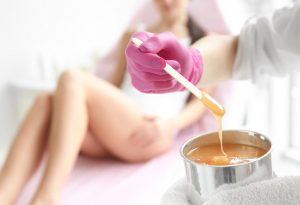In this Article
- Why is Pubic Hair Removed Before Childbirth?
- Different Ways of Removing Pubic Hair
- When Should You Shave During Pregnancy?
- Benefits of Shaving Pubic Hair During Pregnancy
- Risks Involved in Shaving Pubic Hair While Pregnant
- What to Do if You Are Concerned About Shaving Pubic Hair Before Childbirth
- Things to Remember
Experts have found that there is a small decrease in infection rates in pregnant women when the hair on the perineum, which is usually removed in bikini waxes, is left in place, In fact, experts now recommend women to not shave off their pubic hair, especially after 36 weeks of pregnancy. However, this is mostly a personal choice, and as long as it is done safely, you can proceed with hair removal.
Why is Pubic Hair Removed Before Childbirth?
Pubic hair removal during pregnancy is helpful in caesarean deliveries, as shaving the hair helps in making suturing easier and also reduces the risk of infection. In case of a difficult delivery, a cut must be made at the opening of the vagina. This procedure is called an episiotomy, and shaving is recommended in this case, so as to rule out any chances of infections.
Hair removal can be done using normal hair removal methods like waxing, hair removal creams, electric shavers or normal shaving blades, as long as it is performed in a safe and hygienic manner.
Different Ways of Removing Pubic Hair
Pregnancy often brings on thicker hair growth in places most women would rather not have any, like armpits, bikini line, upper lip, belly etc. Fortunately, this is only temporary, and hair growth should go back to normal six months after delivery. In the meantime, here are some ways to remove pubic hair safely during your pregnancy:
-
Waxing and Sugaring
In this method, heated wax syrup is spread over the skin and pulled off to remove the hair. If waxing is your preferred method of hair removal, visit an expert for safety and do not try to do it yourself.
-
Hair Removal Creams
Use this method only if you have done it before, as there are chemical substances in the cream that can cause irritation if you have sensitive skin. While there is no real evidence that these creams cause harm to a developing foetus, it is still better to consult your doctor before using this method.
-
Electric Shavers
Electric shavers can be used throughout the pregnancy. They are one of the easier options when it comes to hair removal. Like with any of the other methods, care should be taken when using an electric shaver. Use only clean and sanitised blades.
-
Regular Shaving Blade
This method requires the use of a foaming agent and most women tend to do this in the shower. Many slip-ups can occur, especially when shaving your private area, so be careful or ask your partner or a friend to help.
-
Trimming Scissors
Trimming scissors do not completely remove the hair, but they do keep the hair short and make the area relatively neat and tidy. They do not pose much threat unless you cannot see what you are doing. It is recommended that you ask your partner to help you, when your baby bump gets too big to see past.

When Should You Shave During Pregnancy?
While shaving the way you normally would during the entire duration of the pregnancy is completely fine, make sure you use clean and sanitised blades and tools. Even better, go to a professional to get the hair removed. However, it is best not to shave or wax for a week before your due date, so as to avoid any infections that may be caused in any of the small cuts that could occur during hair removal.
Benefits of Shaving Pubic Hair During Pregnancy
Here are some benefits of shaving pubic hair during pregnancy:
- Microbes tend to thrive in pubic hair, and if they get transferred to the baby, the baby risks getting an infection. Removing pubic hair makes it easier to stop this from happening, as keeping the area clean becomes easier.
- If your gynaecologist sees the need to make any interventions during labour, he/ she will be able to have a better view if your private area is shaved or trimmed.
- Trimming or shaving the hair reduces sweating and moisture retention in the private areas, thus, making it easier to keep clean.
- There is excessive bleeding post-delivery and when the blood sticks to the pubic hair, it becomes difficult to wash it off. In this situation, it may be less painful and more convenient if the area is trimmed.
Risks Involved in Shaving Pubic Hair While Pregnant
On the flip side of the coin, here are some risks that you should keep in mind:
- If sterilised tools are not utilised and hygienic conditions are not observed, it can lead to infections.
- When shaved hair grows back, there is often an itching and sometimes prickly sensation that can cause a lot of discomfort around the healing sutures.
- Ingrown hair is very painful when they turn into small bumps in the skin. These can form as a result of careless shaving and can cause additional discomfort and pain.
- Your baby bump will soon block out your view, and you will need to resort to asking someone for help, be it your partner or an expert, if you want it to be done safely and without any mishaps. This is something that a lot of women are uncomfortable with.
What to Do if You Are Concerned About Shaving Pubic Hair Before Childbirth
- Always consult your doctor if you are unsure about anything.
- Speak to women you know who have already had children, and find out about their shaving/ non-shaving experience during labour.
- It is always best to ask your partner for help or to go to a professional if you do decide to shave.
- Follow all the hygiene advice given with whatever method you decide on.
Things to Remember
If you decide to remove your pubic hair, you can do it before getting to the hospital or ask a nurse to do it for you. Here are some things to remember in either case:
Before the Hospital:
- Use shaving cream and clean tools. Feel your way through it and go slow, so as to avoid any cuts.
- Lying down on your back in the bathtub could help you see what you are doing better.
- Place a mirror on the floor or on the wall to help you see better.
At the Hospital:
- Make sure that the nurse who is going to shave you uses a new razor pack. It is best to see them open the packet in front of you.
- If you are in any pain, let the nurse know, as even small cuts can get infected.
- You may feel some embarrassment by exposing your privates to a nurse. Note that nurses are professional and will behave accordingly. It is standard procedure for them and they can even provide valuable advice.
While there are different views and opinions about whether or not to remove pubic hair during pregnancy, it is seen that as long as all of the hair is not removed, especially from the perineum, there really is not much difference in the science of it all. It comes down to personal preference and the procedure that your hospital follows. As long as the circumstances of your labour are normal, and you do not have to undergo a C-Section or difficult delivery, it is likely your doctor will agree to you not removing the hair.in our conditions removing hair is recommended during any form of delivery.
While there are a few methods of hair removal that are safe to follow, the best way to remove pubic hair during pregnancy is to trim it as short as possible, rather than to remove it completely as this keeps the area clean, allows the doctor to have proper vision during labour, and does not come with the itchy sensation that accompanies hair growing back after shaving. No matter what you choose, always consult with your doctor first to ensure that all goes smoothly during childbirth.










